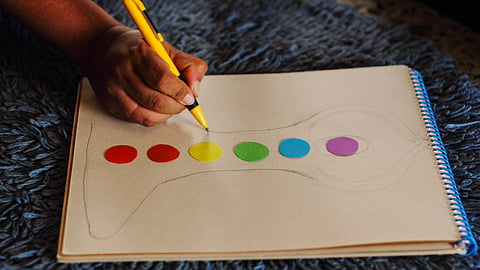Dyspraxia
What is dyspraxia?
Dyspraxia is a developmental coordination disorder that affects fine/gross motor coordination. Children with dyspraxia have difficulty managing fine motor activities such as brushing teeth, tying shoelace, holding objects, moving and arranging things, or managing posture.
Dyspraxia often coexists with other conditions such as dyslexia, dyscalculia or Attention Deficit Hyperactivity Disorder (ADHD).
What are the signs of dyspraxia?
Children with dyspraxia may have difficulty in the following areas:
Gross motor skills
Holding objects without dropping them.
Managing physical coordination while playing games or while exercising.
Walking, skipping, throwing or catching ball, or riding a bike.
Moving around without bumping into things or knocking things over.
Participating in games and activities that require good hand-eye coordination.
Fine motor skills
Doing tasks that require fine motor skills; example, buttoning, holding a pencil or cutting with scissors.
Working with small objects, such as building blocks, or puzzle pieces.
Speech
Modulating voice (volume, speed, tone, pitch).
Speaking clearly and not too slowly.
Socio-emotional
Feeling confident about performing tasks, playing sports or communicating.
Engaging in team games.
Interacting with children and adults.
Memory and focus: Remembering and completing a sequence of tasks in school or at home (packing school bag, completing homework, carrying lunch bag, and so on).
Spatial relationship: Accurately placing or moving objects from one place to another.
What causes dyspraxia?
The exact cause of dyspraxia is not known, but it is oberved that the condition may be due to the problem with the nerve cells that send signals from the brain to the muscles for coordination.
How is dyspraxia diagnosed?
There is no single test to diagnose dyspraxia. A specialist such as an occupational therapist may evaluate the condition based on the following criteria:
- Delayed development of motor skills
- Weakness in motor skills is not due to other neurological conditions such as cerebral palsy
Getting treatment for dyspraxia
Parents can reach out to an expert such as an occupational therapist, speech therapist, special education expert, or any child psychiatrist to understand the condition, and seek help.
Caring for someone with dyspraxia
A child with dyspraxia may have difficulty in expressing their thoughts, feelings, or problems, but as caregivers, you can encourage the child to speak and express their difficulties. You can also encourage your child to do easy physical activities that help in developing coordination thereby increasing their confidence.
We are a not-for-profit organization that relies on donations to deliver knowledge solutions in mental health. We urge you to donate to White Swan Foundation. Your donation, however small, will enable us to further enhance the richness of our portal and serve many more people. Please click here to support us.


